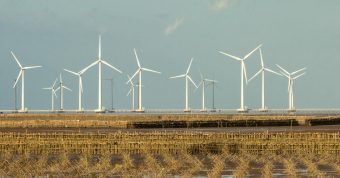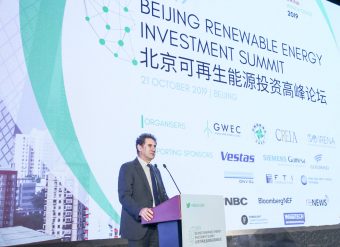
Asia could grow its share of installed capacity for onshore wind from 230 Gigawatt (GW) in 2018 to over 2600 GW by 2050, a new report by the International Renewable Energy Agency (IRENA) finds. By that time, the region would become a global leader in wind, accounting for more than 50 per cent of all onshore and over 60 per cent of all offshore wind capacity installed globally.
According to the “Future of Wind” published at China Wind Power in Beijing, global wind power could rise ten-fold reaching over 6000 GW by 2050. By midcentury, wind could cover one third of global power needs and – combined with electrification – deliver a quarter of the energy-related carbon emission reductions needed to meet the Paris climate targets. To reach this objective, onshore and offshore wind capacity will need to increase four-fold and ten-fold respectively every year compared to today.
“With renewables, it’s possible to achieve a climate-safe future,” said IRENA’s Director-General Francesco La Camera. “Low-cost renewable energy technologies like wind power are readily-available today, representing the most effective and immediate solution for reducing carbon emissions. Our roadmap for a global energy transformation to 2050 shows that it is technically and economically feasible to ensure a climate-safe, sustainable energy future. Unlocking global wind energy potential will be particularly important. In fact, wind energy could be the largest single source of power generation by mid-century under this path. This would not only enable us to meet climate goals, but it would also boost economic growth and create jobs, thereby accelerating sustainable development.”

The global wind industry could become a veritable job motor, employing over 3.7 million people by 2030 and more than 6 million people by 2050, IRENA’s new report finds. These figures are respectively nearly three times higher and five times higher than the slightly over one million jobs in 2018. Sound industrial and labour policies that build upon and strengthen domestic supply chains can enable income and employment growth by leveraging existing economic activities in support of wind industry development.
But to accelerate the growth of global wind power over the coming decades, scaling up investments will be key. On average, global annual investment in onshore wind must increase from today USD 67 billion to 211 billion in 2050. For offshore wind, global average annual investments would need to increase from USD 19 billion to 100 billion in 2050.
Statistical highlights:
- Asia would account for more than 50% of global onshore wind power installations by 2050, followed by North America (23%) and Europe (10%). For offshore, Asia would cover more than 60% of global installations, followed by Europe (22%) and North America (16%).
- Within Asia, China would take the lead with 2525 GW of installed onshore and offshore wind capacity by 2050, followed by India (443 GW), Republic of Korea (78 GW) and South-East Asia (16 GW).
- Globally, the levelised cost of electricity (LCOE) for onshore wind will continue to fall to 2-3 cents USD/kWh by 2050 compared to 6 cents USD/kWh in 2018. Costs of offshore wind will drop significantly to 3-7 cents USD/kWh by 2050 compared to 13 cents USD/kWh in 2018.
- Wind turbine size for onshore applications will increase, from an average of 2.6 megawatts (MW) in 2018 to 4-5 MW for turbines commissioned by 2025. Offshore applications will likely increase to 15-20 MW in a decade or two. Floating wind farms could cover around 5-15% of the global offshore wind installed capacity (almost 1 000 GW) by 2050.
Read the full report “Future of Wind”.



